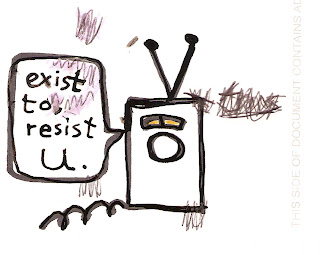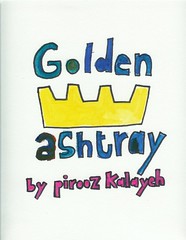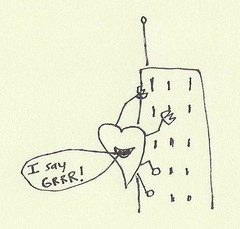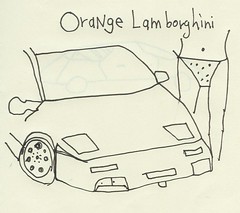

Last night was the first meeting of the translation team. We discussed goals and objectives for how we would go about collecting and selecting Korean authors.
"I want it to be fun. I don't want it to be work," Jim told us. "I just want to get together, drink beers, and have fun."
"That's fine," I said. "We will still have to decide on how we choose poets."
"I will go through the ones in here," Byron said, holding up a volume of Korean poetry. "I will translate the first couple lines, and then I'll give them to you guys. If you decide they work, then we'll contact the authors. If you decide that a translation is too hard, then you can do remixes."
"Remixes are fine," I said. "But I would like to do a traditional anthology first."
"You seem to have a clear idea of what you want to do with this thing. I just want to have fun. I want to get away from this anthology thing. Why call it an anthology? Anthologies are no good."
"I'm just using the word anthology. It will be considered one regardless of what name we give it. Let's not argue semantics. If you want me to refer to it as something else, then let's give it a title."
Byron and Jim discussed possibilities. I had a talk with SY about meeting with one of the preeminent Korean scholars in Seoul.
"Oh, he's nice," she told me. "I've met him."
"I'm sure."
"I can go with you."
"Why not?"
"We can talk to him together."
"Okay."
"This is Korea!" Byron said loudly.
"What is?" I asked.
"Oh, we're just coming up with names for the book."
As we argued various points of responsibility to the Korean people - whether we would omit for taste or include for posterity - the topic of discussion slowly edged to the ease of letting it be what it would be.
"I would say," Byron gestured inlcusively with his hands, "We just go through, make these translations, and then see where we end up. We could have one book of remixes and traditional translations. Or," he smiled. "We could have two books."
"Yes," Jim nodded. "Let's just see where this goes."
"Yes," I smiled.
"Good," SY agreed. "Lets go eat."

We decided to go for lamb at a small Chinese place about 10 minutes away. Some of us, myself included, grumbled at the distance, but managed to have residual laziness placated once we stopped at an American goods store with a cornucopia of Western fare. All was forgiven once I saw oatmeal. I quickly made use of an ATM-shaped-phonebooth to get shaving balm, Eclipse gum (gum has no flavor in Korea), and my precious, Maple Brown Sugar and Oatmeal. I was in heaven.
"I'm in heaven," I told Byron.
"Yeah, man," Byron agreed in his Carolinan accent. "A lot of good stuff here."
After I stuffed my bag of precious goods into Byron's backpack, and we finally made a left-right-left and left again turn, we finally arrived at the lamb place. It was a nice little restaurant. There were several foreigners there, and a generous amount of fashionable Koreans, with bug-eye-shades and long hair cropped Dumb and Dumber style across the forehead, while the remaining locks lay over faux army fatigue jackets, high-heeled boots, and double eyelets (earrings) on every ear.
I admired the fashion statements while chewing the small morsels of lamb that were pre-grilled in the kitchen, and then put on skewers over a grille inside our table.
"Mine!" Byron barked, and snatched a skewer out of my hands. "Get your own!"
"Your mamma," I smiled. "She's mine."
"Man," B. smiled sheepishly. "Why you got to keep messing with my mamma?"
"I can't help it," I laughed. "She keeps messing with me!"
We laughed and had two plates of lamb, before our sitting limbs needed a refresher of movement and excitment.
"Let's go to the art bar that Jim got thrown out of!" Byron joked.
"Yeah, sure," Jim nodded. "Let's go!"
I got these pictures at the bar. They speak for themselves. But, to add a little clarity, the large man, Chang Yeun, is a heavy metal drummer from Sinchon. His crew of musicians wanted to discuss Western music with us. They also wanted to show Jim their wicked dance moves.



After watching everyone dance up a storm, we headed to Beatles, a bar covered in Beatles posters and memorabilia.
"We can have our Guiness," Jim smiled.
"Yes," I smiled back.
Probably one of the only bars in Seoul that offers Guiness on tap and a slew of records to choose from while sipping and chatting, it is definitely a great place to wind the night down. I enjoyed Chang Yeun's questions about music, Jim's choice to play Pink Floyd, and SY's incredible translation skills.
"He says," SY nodded to Chang Yeun, "That jazz drummers don't respect rock drummers in Seoul."
"Tell him not to worry about it," I said back. "Tell him if he concentrtes on himself and lets all this other stuff go, he'll be much happier."
"He says," SY translated. "That it's hard for him to communicate with Westerners in English. He says his English isn't very good and that makes him embarassed."
"No," Jim piped. "It's good! Talk in English!!"
"No," Chang Yeun laughed. "Not good."
"No good!" Jim disagreed.
Chang Yeun laughed again. Then he went into his view of English teachers and foreigners via SY:
"Most Koreans do not respect English teachers in Seoul. They have bad manners. This is not good. I have often talked to some Westerners and they'll just ignore me. They don't want to engage in any conversation. I find this frustrating. I want to talk about music and broaden my language and music skills. But, most of all, I just want to talk about what I love, music. Why are Westerners like this? Why do some of the teachers here ignore me or not take me sriously."
"There are good teachers and bad teachers," Jim explained. "You are sitting with good teachers."
"But some people ignore him," SY translated.
"I won't," Jim said and put a hand on Chang Yeun's shoulder. "I won't ever ignore you."
SY and I smiled at this gesture. Chang Yeun was also touched, "I feel very comfortable around all of you. It is much easier for me to say my English."
"Good," we all agreed, and lifted our glasses to mark the occasion.
"To us!" I said. "To music, to friends, to now!"
After a generous offer to play one final song, Beatles began to close up shop. We all stared around the bar and each other as Cindi Lauper's "Time After Time" soaked us with its nostalgia and beauty.
"Such a good song," Jim shook his head in amazement. "Cindi Lauper."
"Yes," I agreed. "It's the perfect song."











































